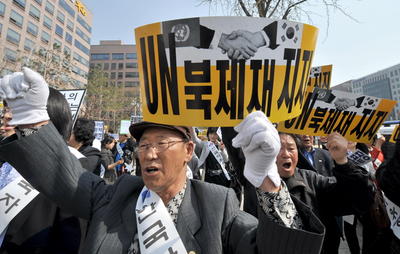We have sanctions against the import of certain materials and ‘luxury’ goods, but whether that includes red, black, or blue Johnny Walker scotch is a question.
Sanctions are a tactic employed by one state against another state and/or its leadership to indicate displeasure and promote change.
They may involve in whole or in part prohibition of imports, exports, sales, investments, financial transactions, travel, with a variety of unpleasant consequences.
But what does the severity of sanctions measure? The degree of displeasure? Pressures for regime or leadership change? Foreign policy shifts? The severity of a dictatorship or its type-military or party or otherwise? The extent of human rights abuses? The moral high ground? Once easily imposed, however ineffectual in achieving any goal more than moral condemnation, they are difficult to remove. US sanctions against Cuba are probably the prime example.
In a recent Congressional Research Service study of the possible effects of the Korean Free Trade Agreement on Kaesong Industrial Park exports by South Korean firms physically in North Korea, it noted:
‘The United States does not maintain a comprehensive embargo against North Korea. However, imports from North Korea require approval from the Treasury Department’s Office of Foreign Assets Control (OFAC).’
Yet, there are comprehensive sanctions against Burma/Myanmar imposed in three separate bills in 1997, 2003 and 2008. Together these include all of the factors noted above with the addition of interbank transfers that go though the US, which many international transactions do even if they do not originate in the US.
Does the US government really believe that the present, newly elected (admittedly in an unfair election) government or the previous military rulers are worse than those in North Korea? The estimated 2,000 political prisoners in Burma/Myanmar seem far less than the 200,000 or so in North Korea. There is far more freedom in Burma/Myanmar, where civil society exists, even if it does not flourish, than in the rigidly controlled North. Now, even policy criticisms can be public and in the presence of the head of state. Opposition parties, albeit small, are in the legislatures. Sanctions have not results in its goal-regime change. Yet there is now a call for more and targeted sanctions, as though past failure will miraculously lead to success, and even a UN commission of inquiry into crimes against humanity. The Congress is pushing the administration into further, ineffectual corners.
Why the disparity, and is that good policy? Rationality is evidently not the answer. The US tried to ‘open up’ North Korea to the outside world, but we try to shut off Burma/Myanmar, and get other states to follow our example.
When this question-the discrepancy between US imposed sanctions on North Korea and Burma/Myanmar– was posed to a member of the administration, the response was: ‘The answer is there’s no Aung San Suu Kyi in the DPRK, only Kims.’ Is that the way to run foreign policy?
David I Steinberg is Distinguished Professor of Asian Studies, School of Foreign Service, Georgetown University.

